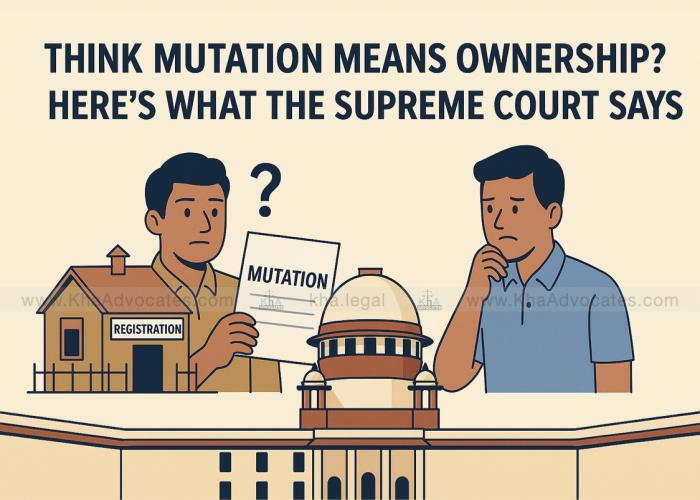
Published on: May 25, 2025
Does mutation of property mean you’re the legal owner? Think again.
In the world of Indian real estate, “mutation” is a commonly misunderstood term. Many believe that once a property is mutated in their name, they automatically become the legal owner. However, the Supreme Court of India has clarified this misconception through several landmark judgments. Let’s unpack what mutation really means—and more importantly, what it doesn’t.
Mutation refers to the process of updating or recording the transfer of title of a property in the revenue records of the local municipal authority. This allows the government to charge property tax from the rightful person.
Mutation may be required:
After the purchase of property
Upon inheritance
Via gift deed or will
Through a court decree
However, mutation is not a document of title. It is merely a fiscal record maintained for administrative purposes.
The Supreme Court held that mutation entries do not confer any title nor do they have any presumptive value on ownership. They are primarily for revenue collection and cannot be used as conclusive proof of ownership in a court of law.
“Mutation does not create or extinguish title. It does not have any presumptive value on ownership.”
– Supreme Court, Balwant Singh vs Daulat Singh
This judgment reinforced that mutation is not a mode of transfer of ownership. The Court stated that unless there’s a valid legal transfer through sale, gift, or inheritance, mutation cannot determine ownership rights.
The Court held that revenue entries (mutation) are not documents of title, and ownership can only be proved by valid documents such as registered sale deeds, gift deeds, or court decrees.
The Court clarified that even if someone’s name is entered in municipal records via mutation, it cannot override the rights of a person holding a legally registered title deed.
Myth | Reality | ||||||||||||||||
|---|---|---|---|---|---|---|---|---|---|---|---|---|---|---|---|---|---|
Mutation = Ownership | ❌ No, it’s not proof of ownership | ||||||||||||||||
Mutation means title transfer | ❌ Only legal instruments like sale/gift deed do that | ||||||||||||||||
Mutation protects you in court | ❌ Courts rely on title documents, not revenue entries |
Registered Sale Deed
Gift Deed (with mutation as a follow-up)
Probated Will
Partition Deed
Court Decree of Title
While mutation doesn’t prove ownership, it is still crucial for property tax liability, obtaining building permissions, and utility connections. It ensures that the municipal records are up to date and that the right person is billed.
Mutation is not proof of ownership.
It is a record for taxation and revenue purposes only.
Ownership must be proved through registered legal documents.
Supreme Court and High Courts have consistently ruled on this matter.
Always consult a property lawyer before assuming mutation equals title.
At KHA ADVOCATES, we specialize in property law, title verification, mutation assistance, and litigation support across India. Our team handles disputes related to ownership, mutation denial, and false claims, backed by a strong record in High Courts and the Supreme Court.
👉 Contact Us Now for a consultation!

